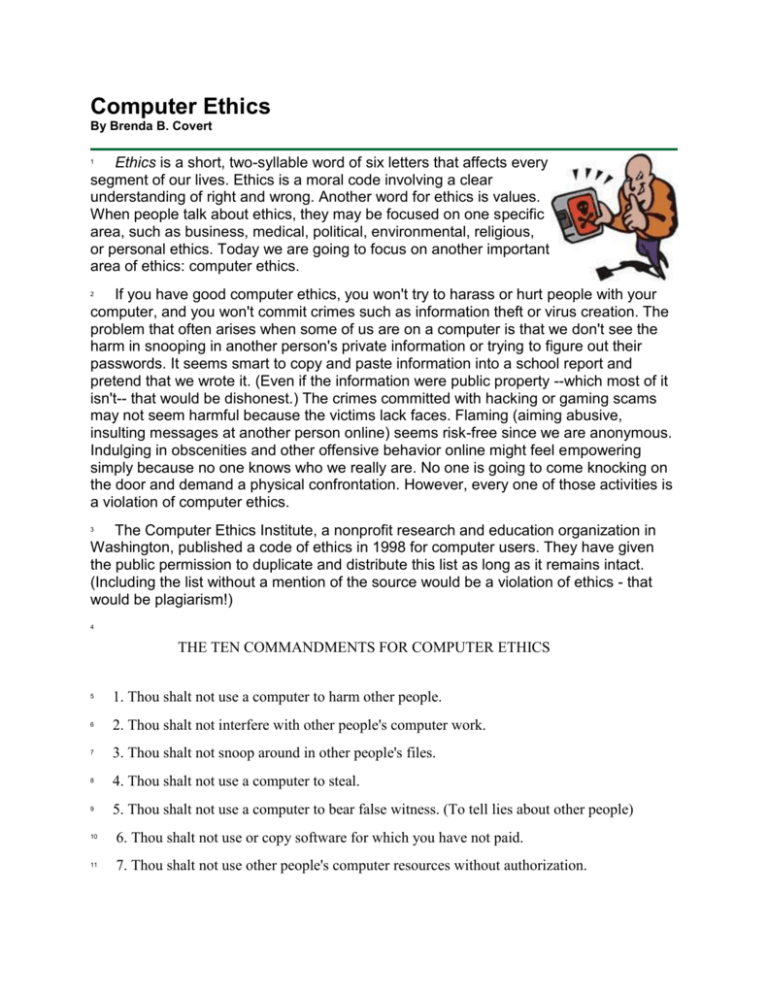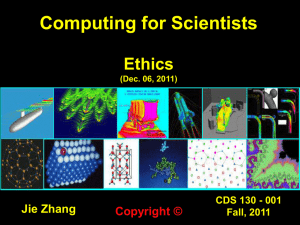Computer Ethics - Boone County Schools
advertisement

Computer Ethics By Brenda B. Covert Ethics is a short, two-syllable word of six letters that affects every segment of our lives. Ethics is a moral code involving a clear understanding of right and wrong. Another word for ethics is values. When people talk about ethics, they may be focused on one specific area, such as business, medical, political, environmental, religious, or personal ethics. Today we are going to focus on another important area of ethics: computer ethics. 1 If you have good computer ethics, you won't try to harass or hurt people with your computer, and you won't commit crimes such as information theft or virus creation. The problem that often arises when some of us are on a computer is that we don't see the harm in snooping in another person's private information or trying to figure out their passwords. It seems smart to copy and paste information into a school report and pretend that we wrote it. (Even if the information were public property --which most of it isn't-- that would be dishonest.) The crimes committed with hacking or gaming scams may not seem harmful because the victims lack faces. Flaming (aiming abusive, insulting messages at another person online) seems risk-free since we are anonymous. Indulging in obscenities and other offensive behavior online might feel empowering simply because no one knows who we really are. No one is going to come knocking on the door and demand a physical confrontation. However, every one of those activities is a violation of computer ethics. 2 The Computer Ethics Institute, a nonprofit research and education organization in Washington, published a code of ethics in 1998 for computer users. They have given the public permission to duplicate and distribute this list as long as it remains intact. (Including the list without a mention of the source would be a violation of ethics - that would be plagiarism!) 3 4 THE TEN COMMANDMENTS FOR COMPUTER ETHICS 5 1. Thou shalt not use a computer to harm other people. 6 2. Thou shalt not interfere with other people's computer work. 7 3. Thou shalt not snoop around in other people's files. 8 4. Thou shalt not use a computer to steal. 9 5. Thou shalt not use a computer to bear false witness. (To tell lies about other people) 10 6. Thou shalt not use or copy software for which you have not paid. 11 7. Thou shalt not use other people's computer resources without authorization. 12 8. Thou shalt not appropriate other people's intellectual output. (It's called plagiarism!) 13 9. Thou shalt think about the social consequences of the program you write. 14 10. Thou shalt use a computer in ways that show consideration and respect. 15 Nancy Willard, executive director of the Responsible Netizen Institute at the University of Oregon's Center for Advanced Technology in Education, has some ideas to help you develop good computer ethics. If you follow her advice, you will develop the kind of ethics that will make you a model student, employee, and citizen. 16 17 Ask yourself these three questions before you make a move to do something questionable. 18 1. How would you feel if your behavior made front-page news? 19 2. How would you feel if somebody did to you what you are thinking about doing? 20 3. How would it look in the real world (i.e. stealing online versus shoplifting)? If you do as Ms. Willard advises, and you make the appropriate choices, you will become known as trustworthy and honest. Those qualities are very important for anyone whose goal is to be successful. Because our society has become so computerized, we need to embrace computer ethics for the well-being of the future. 21 Copyright © 2011 edHelper Name _____________________________ Date ___________________ Computer Ethics Use the highlighter tool in Word to highlight the correct answers to the following questions: 1. A synonym for ethics would be ________. Skills Standards Ethnic Dishonesty 2. Which of these would not be considered unethical? Using a top ten list in a report and citing the source Pretending to be a college student in a chat room Copying for your own use the software that a friend bought Posting falsehoods about a teacher that has made you angry 3. Why should you ask yourself whether 4. Nearly all students who behave you'd want to see your behavior in the dishonestly say that they prefer others news? to be honest! If that's so, why don't they abide by the Golden Rule? If the authorities find me, they will alert the newspaper. They don't think that a little dishonesty really matters. If I wouldn't want everyone to know about it, then I shouldn't do it. They probably think that they are. I'll be able to tell how badly I want They don't know that what they to be a celebrity. are doing is wrong. I'll find out whether I'm doing it for They think that they are better the attention it brings me. than everyone else. 5. Why should you ask yourself how your 6. The Ten Commandments for Computer behavior would look in the real world? Ethics boils down to ______ for others. We live in the real world. Respect I may be asked to be on The Real Service World TV show. Contempt It will help me recognize unethical Sympathy or criminal behavior. While I wouldn't do it face-to-face, I have the freedom to do it online. Name _____________________________ Date ___________________ Computer Ethics 7. Your father left the room without logging 8. You signed up for an hour on the off his bank's website. What should you computer at the library. While you are do? playing an online game, a classmate asks if you would mind logging off and Ignore the temptation to peek at allowing him to do some research for a those financial records. class assignment. You: Find out if there is enough money Agree to give up your remaining in there to cover a DVD player. computer time Peek at his bank balance, and Make a vulgar gesture and turn then share the news with my friends. back to your game Slip over to the computer and see Tell him to wait his turn like how much money he has. As a member everybody else of the family, I have a right to know. Tell him that you are in the middle of doing research on games Computer Ethics Open Response Question: Do you believe people are more or less ethical than they were fifty years ago? Explain your answer using at least three examples. Your answer to this open response question should be at least 3 paragraphs in length with at least 4 sentences in each paragraph. Upload this file when you are done!








